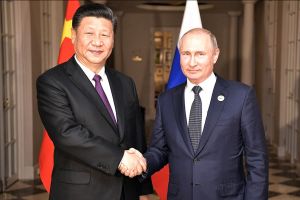Arik Burakovsky, Dina Smeltz, and Brendan Helm analyze a survey of American experts on Russia about opinions on the country's relations with China and India.
Introduction
To better understand how experts think about Russia’s relations with the other great powers, The Fletcher School of Law and Diplomacy at Tufts University and the Chicago Council on Global Affairs recently conducted a survey of 201 American experts on Russia. The survey finds that a majority describe the relationship between Russia and China today as one of mostly partnership. They also describe India as primarily a partner to Russia, both today and in the future. By contrast, they say that Russian relations with the United States and the European Union are mostly competitive. But they anticipate that in 20 years, rivalry between Russia and China will grow, perhaps creating space for reducing tensions with the United States.
Key Findings:
- A majority (68%) of experts believe Russia and China are currently mostly partners. Opinions on whether this trend will continue in 20 years are mixed, with 49 percent of experts saying they will remain mostly partners and 46 percent saying they will be mostly rivals.
- India is seen by experts as even more likely (78%) than China to be mostly partners with Russia. Experts see this trend continuing two decades from now, with 76% predicting they will stay mostly partners.
- While experts currently see Russia and the EU as more rivals (84%) than partners (14%), they predict that ties between Russia and the EU will thaw and that they will be more partners (54%) than rivals (39%) in 20 years. One reason for this prediction is the belief held by most experts (57%) that EU sanctions will be removed within the next decade.
- Nearly all experts (96%) believe the United States and Russia to be mostly rivals. A slightly lower majority predict that they will remain mostly rivals 20 years from now.
Methodology
The report is based on a survey among selected American experts from the government, top universities, and research institutes. The Chicago Council team identified researchers, academics, and policymakers who attended the 2019 Association for Slavic, East European, and Eurasian Studies (ASEEES) conference and selected those who self-identified as American citizens. The participants in the ASEEES conference represent a broad swath of experts from across the United States who specialize in topics which concern Russia, Eastern Europe, the Caucasus, and Central Asia, as well as US-Russian relations. Of those who responded to the survey, 55 percent were male, and 45 percent were female. In terms of partisan affiliation, there was a much greater proportion of Democrats (66%) than Republicans (4%) or Independents (24%). Just 3 percent reported having served in the US military, while 17 percent reported having served in the US government. Nearly all the respondents currently reside in the United States (94%), and despite the 2019 ASEEES conference being held in San Francisco, California, there is fairly even representation of experts from across the country. The survey was fielded using Qualtrics, an online survey platform. The Chicago Council initially targeted 2,198 experts by email on January 27, 2020. The final reminder email was sent on February 9, 2020, and the fielding of the survey was closed on February 20, 2020.





